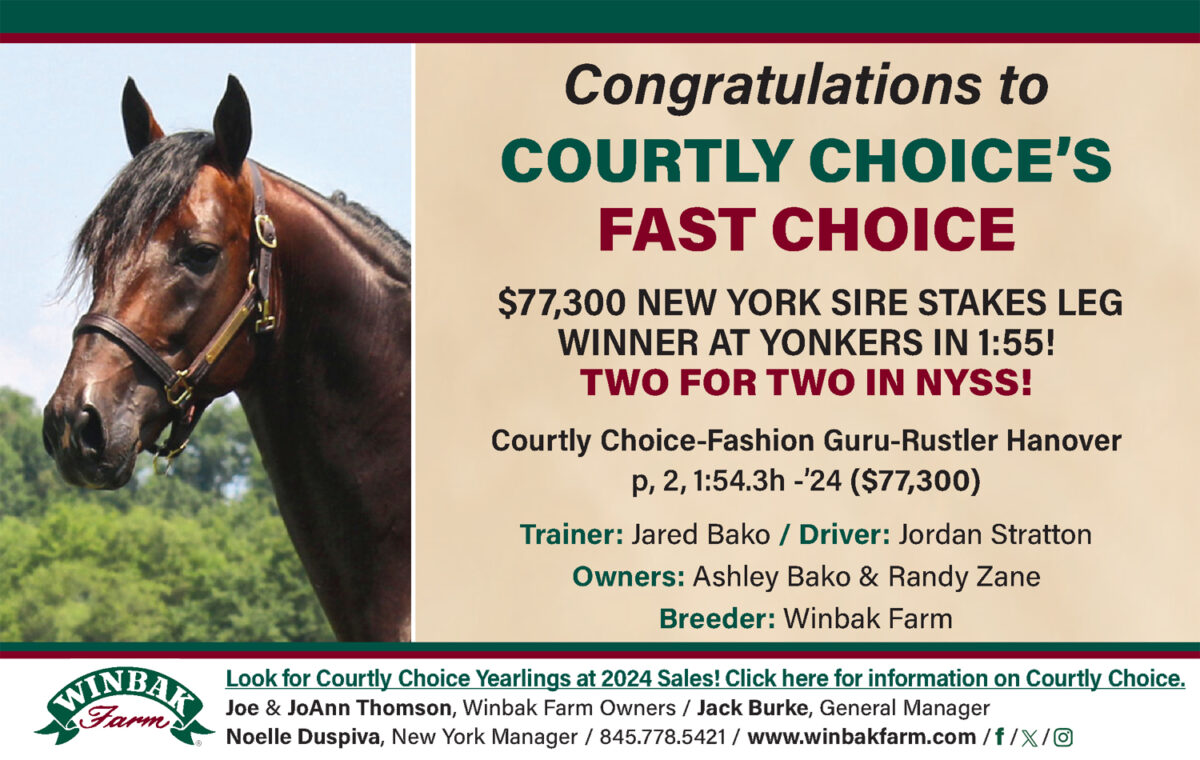

Growing pains for the SRF Series
With short fields in all four finals, The Meadowlands’ SRF series needs a little work.
By Debbie Little
When The Meadowlands’ president/chief executive officer Jeff Gural created the Standardbred Retirement Foundation (SRF) series, its purpose was twofold.
“We’ve had many requests for something like this,” Gural said in a December press release announcing the creation of the series. “I wanted to have races that can be counted on for young horses in April before the stakes season starts and at the same time show our commitment to helping find a home for retired horses and came up with this idea. Hopefully, the horsemen will support our efforts to provide these races and at the same time help the Standardbred Retirement Foundation’s cause by racing their young horses.”
Horsemen did indeed support the series — composed of three $20,000 legs and a $40,000 final — for green 3-year-olds of each gait and sex.
A total of 175 entries came in and each one brought a $200 donation to the SRF, which was generously matched by The Meadowlands, resulting in a $70,000 total contribution to the SRF.
According to The Meadowlands’ racing secretary, Scott Warren, the series has had pluses and minuses.
“The nominations exceeded what I thought we would get for it, but the declared entries were below what I thought we’d get for it,” Warren said.
Of those 175 nominees only 45 actually dropped in the box.
The first weekend of the series — Friday (March 31) for pacing and trotting fillies and Saturday (April 1) for their male counterparts — saw the most entries with 19 females and 16 males dropping in.
Trainer Joe Holloway, who has pacing colt Sheer Terror, a $270,000 Always B Miki—Economy Terror yearling and half-brother to One Eight Hundred, competing in the final (Saturday, April 22, race six), thinks the series is a good thing for The Meadowlands and young horses.
“It’s never easy to get a top horse started back up, but it’s also not easy to get a young horse that’s inexperienced ready to come back and race the top horses,” Holloway said. “Here, you can get a few starts against the same level horses for a period of time.”
Although each pacing division saw a total of 15 entrants participate throughout the series, both finals only have seven starters.
The two trotting divisions also have seven-horse finals, but it’s not as unexpected since the colts and fillies only had seven and eight total series starters, respectively.
Trainer Ron Burke, who has two fillies competing in tonight’s (April 21) finals, trotter Cyberspace (race four) and pacer Ultimate Loulou (race six) thinks the number of starters may have been impacted by the well-established Bobby Weiss Series for 3-year-olds at Pocono.
“I think the Weiss hurt them,” Burke said. “People are creatures of habit and the Weiss is free.”
Burke said he thinks the SRF series may have started a week too early but does like to see The Meadowlands hosting a spring series.
“That’s one thing we got away from at The Meadowlands where we shouldn’t have,” Burke said. “The late closer program there used to be the best. We miss the Four Leaf Clover, the Trendsetter, the White Ruffles. It was a great place to race a young horse and make money.
“Maybe they weren’t going to be Niki Hill but they were still going to be good horses.”
On Saturday (April 22), 11 of The Meadowlands’ 15 qualifiers are for 3-year-olds. Although all would not have met the conditions of the SRF, a bunch certainly do, so perhaps starting the series at least one week later would benefit the track moving forward.
For a little perspective, The Meadowlands scheduled four similar series for 3-year-olds in April 2019: the Walner and Wiggle It Jiggleit for male trotters and pacers, respectively, and the Shake It Cerry and Worldly Beauty for trotting and pacing fillies, respectively.
The nominations for the “Cerry” and “Beauty” — 15 and 17, respectively — were so low that the series were immediately cancelled.
The male series were well supported both through nominations and entries, with the male pacers actually needing multiple divisions in all three legs. Holloway had a colt in the Walner final, while Burke had three, including the winner. Burke also had two in the Wiggle It Jiggleit final.
These colt and gelding series were also raced at the same time as the Weiss, which began in 2012.
To be fair, only six of the 45 horses that started in a leg of the SRF left it for the Weiss.
Trainer Linda Toscano’s pacing filly C Is For Cookie competed in the opening leg of the SRF before shifting over to compete in the first two legs of the Weiss — April 10 and 17 — both of which she won.
According to Toscano, choosing to race in the Weiss rather than the SRF was a decision made by the filly’s owner Seth Rosenfeld (Birnam Wood Farms).
“Honestly, in her case, the owner is the breeder and she’s going to be racing on the five-eighths mile tracks because she’s Pennsylvania eligible and he gets roughly a 25 per cent breeder’s bonus by racing in Pennsylvania. So, we just decided to shift gears and go the direction of the Weiss,” Toscano said. “I think that the SRF is a great series. I think maybe it should have been scheduled a little bit better so that it wasn’t up against the Weiss, because we’re always scrambling for [races for] young horses.
“But scheduling is always a problem and unfortunately to the victor goes the spoils. Somebody’s going to lose on this end of it and I think the short fields on the five-eighths-mile track have a tendency to win out sometimes. But, in my case, that wasn’t it. Honestly, talking to Seth — he owns her, he bred her — there was far more for him to gain to race her in Pennsylvania.”















